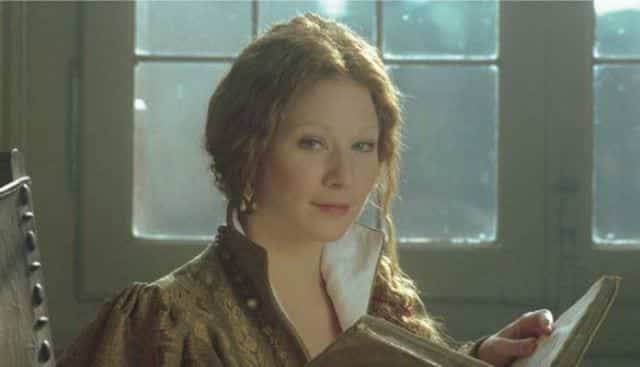This article discusses the most powerful Shakespeare female characters across all of his plays. Social and political power was entirely in the hands of the men in Elizabethan England and particularly, well-born men. Both women and men in the lower classes were powerless but women in the upper classes were in a particularly unenviable position as their value was generally reckoned to be a rich or powerful man’s path to more riches or more power: daughters were considered to be possessions and were passed from father to husband to forge alliances between the rich and powerful. The father had the sole right to make the decision about his daughter’s marriage. Once she was married her function was to produce an heir, and daughters who could be used for the family’s further advancement.
One cannot, therefore, talk about Shakespeare’s powerful women in the social or political sense, but there are a number of very powerful women in Shakespeare, in the personal sense. They sometimes have political influence behind the scenes, working on their husbands to bring about some political result. Also, using the Elizabethan theatre convention of women disguising themselves as men, Shakespeare is able to present some women in a way that allows them to be taken seriously. At the end of the plays where he does that, however, the women always revert to their female role and the conclusion is marriage and declarations of their subservience to men and their reversion to the conventional female role. Perhaps even Shakespeare failed to imagine the model of equality that is so familiar to us and which we take for granted.
Nevertheless, all the men in those cultures are surrounded by women, some ineffectual but many very strong. Every male has either a grandmother or a mother, a sister, or a daughter who he knows to be strong, even though she may be wearing clothes that signify her submissive condition, such as head and face covers, whole-body coverings, etc.
One of the most interesting things in Shakespeare is his presentation of strong women. Here is a list of ten of the strongest Shakespeare female characters:
Cordelia in King Lear
The vain and foolish Lear decides to retire as king and give all his lands and money to his three daughters, their portions based on their declarations of how much they love him. The two older daughters, Goneril and Regan, go overboard in their hypocritical statements. Cordelia says she loves him according to her duty as a daughter and the bond between a parent and child. Enraged, he banishes her and tells her two suitors, both princes, that whoever wants her can have her but without the dowry, they had been expecting. The Duke of Burgundy declines but The King of France agrees to take her for herself. She has stood up to her father, showing great courage. Later, when the other two have cruelly rejected Lear and he lies, defeated and imprisoned in a dungeon, she is with him, also imprisoned – she comforts him and raises him up. She has helped him to learn what the bond between a father and daughter is. She has shown great strength throughout, and when her sisters have her hanged. Lear dies of a broken heart.

Keira Knightly plays Cordelia in King Lear
Portia in The Merchant of Venice
Portia is unusual in that, since her father’s death, having no brother, she has had to perform the role of a man and manage the very wealthy estate he has left her. Nevertheless, he has been able to exercise power over her from beyond the grave by stipulating in his will that those wealthy and powerful men who come to woo her from around the world will have to undergo a test and choose from three caskets, one of which contains the permission to marry Portia. When a judge is required by the Duke of Venice to try the case Shylock has brought against Antonio, who is reluctant to yield the pound of flesh he has agreed to give Shylock if he is unable to pay a loan in time. Portia comes disguised as a famous young judge and shows extraordinary qualities in delivering her judgment. Her power lies in her wisdom, recognised by all those who do not know that she is a woman. In a real sense, she exercises power over everyone present.

Lynn Collins plays Portia in The Merchant of Venice
Lady Macbeth in Macbeth
Lady Macbeth is thought of as a very strong woman. She certainly exercises power over her husband, Macbeth, in the first half of the play, as she encourages him to murder Duncan. She uses her sexuality, she taunts him and mocks his lack of courage. She appeals to his sense of obligation towards her. She comes in more strongly as he wavers and finally he goes ahead with it. She seems like a strong woman but psychologically, she is not strong enough to deal with her guilt. Their marriage falls apart and they become estranged. She suffers terrible nightmares and finally commits suicide.

Erika Sunnegårdh as Lady Macbeth
Much Ado about Nothing is a remarkable play in which Shakespeare intertwines an ancient mythological story with an ultra-modern love story invented by himself. Beatrice is a feisty, independent woman, seen by all those around her as such. She does not have to disguise herself as a man because of her reputation in the family as a feisty woman who shouldn’t be tangled with. She is highly intelligent and would be regarded as a feminist in our time. There is no question of her being told who to marry, as she will always do as she pleases, but in any case, she has contempt for men. She particularly dislikes Benedick, a soldier who visits Messina regularly and stays in her uncle, the governor’s, house. Shakespeare has invented the most incredible wordplay between these two characters, who are both anti-marriage. But they are tricked by their friends into falling in love. Beatrice draws Benedick into a plot to get revenge on Claudio, who has betrayed her cousin, Hero, who was about to marry him. The play ends with the couple confirmed in their love and their decision to marry. Beatrice reverts to the traditional female role but in her case, there is a decided edge to it.
Juliet in Romeo and Juliet
Juliet would not be thought of as a woman in our time but at just fourteen she is already a commodity which her father, a rich merchant, is preparing to trade for a connection with a noble family. He is in the middle of that process just as she is falling in love with the teenaged Romeo. She has only one thing on her mind – to marry Romeo, who is not only not her father’s choice, but forbidden fruit in that their families are involved in an ancient feud in which all contact between them is forbidden. Without telling her father the reason, she refuses to marry the Count of Paris. This is spectacularly brave for the time and her father, Capulet, simply cannot understand it. He swears at her, threatens her and even strikes her. She does not give way, and desperate for a way out without giving up her love for Romeo, she seeks the advice of Friar Laurence. His solution is to take a drug that will make her appear dead. She will be placed in a tomb and Romeo will come and take her away. She is terrified of waking in a tomb stuffed with corpses but takes the drug. She is a female of enormous determination and courage and is, without doubt, one of the strongest of all Shakespeare’s characters.
Desdemona in Othello
Although Desdemona submits passively to her husband, Othello, as he strangles her to death, she demonstrates her strength at the beginning of the play when her father asks the Duke of Venice to stop her marriage to the Moor, Othello. He has ideas about who he wants to marry her to but she has fallen in love with a black man and he is opposed to their marriage, which has already taken place in secret by that time. The Duke asks her to give an account of herself and in a remarkable speech, she convinces him. In that speech she comes across as a modern woman – an independent woman who has been a good daughter but is now ready to ally herself with her husband. If her father doesn’t like that then it’s just too bad. It isn’t his business anymore. It required enormous strength to say things like that in a room full of powerful men at that time.
Rosalind in As You Like It
Rosalind is the central character in the play. She is disguised as a man throughout, until the end, and is able to organise everyone to fit in with her needs and desires. Her aim is to turn the man she wants to marry into someone who can match her qualities and be as strong as she is.

Bryce Dallas Howard plays Rosalind in As You Like It
Viola in Twelfth Night
Finding herself shipwrecked of the beach at Ilyria, and having lost her twin brother in the wreck, Viola’s first instinct is not to appeal for help as a helpless woman but to disguise herself as a man and find a job as a servant in the household of the Duke. As a man, she has the freedom to move around without a chaperone. Her ability to adapt herself to her circumstances in spite of her female upbringing where she has been protected by men and all decisions about her have been made by men is an indication of her strength. It is not only that adaptation that suggests strength but the ability to manipulate her circumstances for her own desired outcome, which is to marry the Duke.
Margaret of Anjou in four of Shakespeare’s history plays
Margaret of Anjou is a character in four of Shakespeare’s plays: Henry VI Parts. 1, 2, 3 and Richard III. The historical Queen Margaret was the wife consort of King Henry VI of England. In Shakespeare’s tetralogy Henry is a weak king and a meek and mild man. Shakespeare’s Margaret is a ruthless, ambitious, intelligent woman who dominates him completely. She becomes involved in the power games that are going on around her and takes her enemies on. She thrives in a man’s world of politics and war, and even enters the battlefield in Henry VI Part 3 and stabs the Duke of York. In Richard III she acts like a prophet, cursing the nobles for their responsibility for the downfall of the House of Lancaster. All of her prophecies about them come true: they are all betrayed in one way or another and end up being executed.
Hermia in A Midsummer Night’s Dream
Rather than marry Demetrius, the man her father has chosen for her, after arguing her case, she runs away with Lysander, the man she loves. Her father begs the Duke, Theseus, to use the full weight of the law to make her comply and she is told that if she does not marry Demetrius her punishment will be death. Like other strong female characters in Shakespeare, Hermia stands up to her father, and even the most powerful man in their world. She does this with logical argument and remains calm while doing it. She then courageously runs away with her lover. Her strength lies in her calm assertiveness and her determination to control her own destiny rather than hand it to the men around her.
That’s your lot for all Shakespeare female characters. Any we’ve missed out? Let us know in the comments section below!










What about Hamlet’s mother?????
No Imogen?? Cleopatra????
In my eyes, Juliet is actually really pathetic. She acted like a child when she didn’t get her way, and instead of running away like other women did (*cough* Hermia *cough*) she decided to fake her own death. Can we also remember the fact that she’s fourteen? Sure, people died at forty back then, but fourteen is still WAY too young to be getting married. Let’s also consider the fact that five minutes before she met Romeo, Romeo was totally hung up on another girl. He could just be in it for the sex. She married Romeo twelve hours after she met him, knowing pretty much nothing about him other than he’s got pretty eyes and he’s a Montague. This guy could be a serial killer for all she knows! But yeah, there’s my two dollars on Juliet. In a nutshell, she’s young, dumb, and spoiled.
Yes I too find 14 to be too young an age for all that Shakespeare makes Juliet say and do. Even in India a girl of 14 is just a child, at least in our milieu now a days. Mahatma Gandhi said girls became precocious before it was natural only because of the iniquity of child marriage. However I have no difficulty with the play because I imagine Romeo and Juliet to be of suitable age in spite of what the Bard says!
It apparently went completely over your head that Romeo and Juliet takes place in a time where nobility married girls as teenagers–even in the play, Juliet’s parents plan to marry her soon, something that’s even mentioned in this article. She’s young, but it’s not unheard of. So how is it Juliet’s fault that she thinks she’s ready to marry? You emphasize her youth, but then you insult her as stupid and pathetic for acting like … well, a fourteen-year-old. “She acted like a child” because she is basically one. Being “strong” female character isn’t about being perfect and never being weak. She took matters into her own hands to secure what she wanted and it failed, but she tried. She knew her life would be restrictive. Women who hate so much on other women are exhausting.
You both have valid point!
You have a valid point!
Ok girl. That’s offensive. I know we will never meet, but MY NAME IS JULIET even though I hate the jokes everyone makes about my name I love the play. Also your accusation of Romeo being a serial killer is completely outweighed by the fact that he literally DIED for her. Also parents were marrying off their children as young as 12 or younger during that time. Juliet was raised basically in captivity so excuse me if she finds her first love and doesn’t go all in. She had sex with Romeo so he wouldn’t get banished as easily and how would you like it if your dad kept you from your lover? I have yet to experience love of my own but I would not like it. I’m not sure what you would do in her situation but please note during the time this play was written, A; girls were married off at a crazy young age B; Juliet was a teenager. Teenager = hormones = bad choices = suffering in the future. Juliet knew her father would never let her love Romeo so she killed herself as I have tried to do but obviously I have not completed the act. Have a good life knowing that even though I do not in the slightest agree with your opinion and have plenty of evidence to prove it wrong, you have a thought process that makes a good argument for me.
I feel like Emilia, (from Othello) deserves a place on this list, perhaps instead of Desdemona, who in the latter part of the play does all she can to please Othello, and leaves you wanting to scream at her to stand up for herself. Emilia presents ideas that go drastically against the stereotype of the time, going as far to say it is the fault of men that some women cheat in relationships, and also introduces the idea that women have similar wants and needs to men, “And have not we affections? Desires for sport? (talking about sex). The idea that women have sexual desires would have been massively unpopular at the time, especially in literature, as well as a multitude of other views, all well before their time. (The best place to look in Othello if you are trying to find Emilia’s views in act 4 scene 3)
Absolutely!Brilliant!!
I agree Sam… I hadn’t read your message before posting much the same below (though not quite so articulately!)
Taming of the shrew Katherine
What about Katherine, the “shrew”, in “Taming of the Shrew.” I think she represents the anger women of her time felt about their lack of choice in marriage, which goes to the heart of the matter of the time.
Yes. Agree! Katherine, the “ bonniest Kate that ever lived”
What about Isabella in Measure for Measure?
I was going to nominate her until I saw you already did it. I think she is truly one of the Bard’s great underappreciated creations.
I was going to point out Isabella. She’s charismatic.
I kinda like Audrey in As You Like It. She spins Touchstone like a top.
I felt that both the women in Hamlet (Gertrude and Ofelia) were caught up in the man’s world and easily manipulated by those around them. It isn’t by the end of the play that you finally see the strength of Gertrude when she listens to the heartbreak of her son and begins to follow his lead, doing as she pleases without the consent of the king, her husband, but like all Shakespearean plays, she dies. I was annoyed with Gertrude at the beginning but sympathised and liked her by the end as she was simply following her heart. Now, Ofelia, poor poor beautiful Ofelia is but a pawn and played around by the men she loves dearly, Hamlet and her father, Polonius. She was innocence personified and did not deserve the ill-treatment she received, although she shouldn’t be dismissed so quickly as she does have some moments of quick wit and retaliations with Hamlet which I believe if the grief and thirst of revenge didn’t take over Hamlet would have become a strong, lasting union. Is Ofelia portrayed as weak because she goes crazy by the end? Is Gertrude weak because she is ignorant of what is happening around her and caught in the lust of the king? Are they portrayed as typical women of the Elizabethan Age?
Emilia (Lago’ wife and Desdemona’s maid) in Othello.
She nails with her speech beginning: “But I do think it is their husbands’ faults If wives do fall:… “